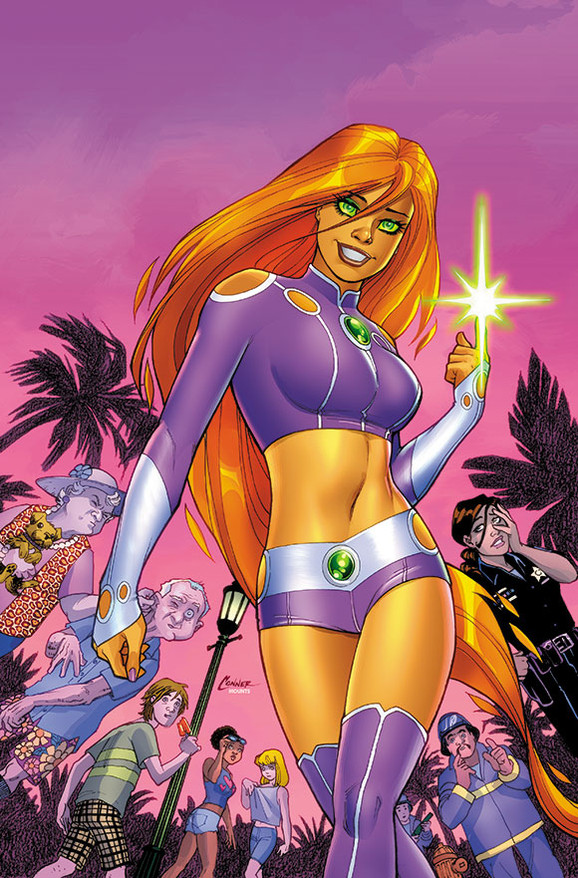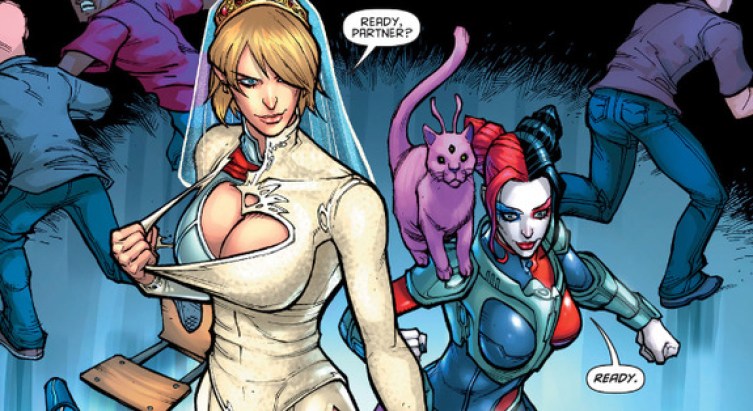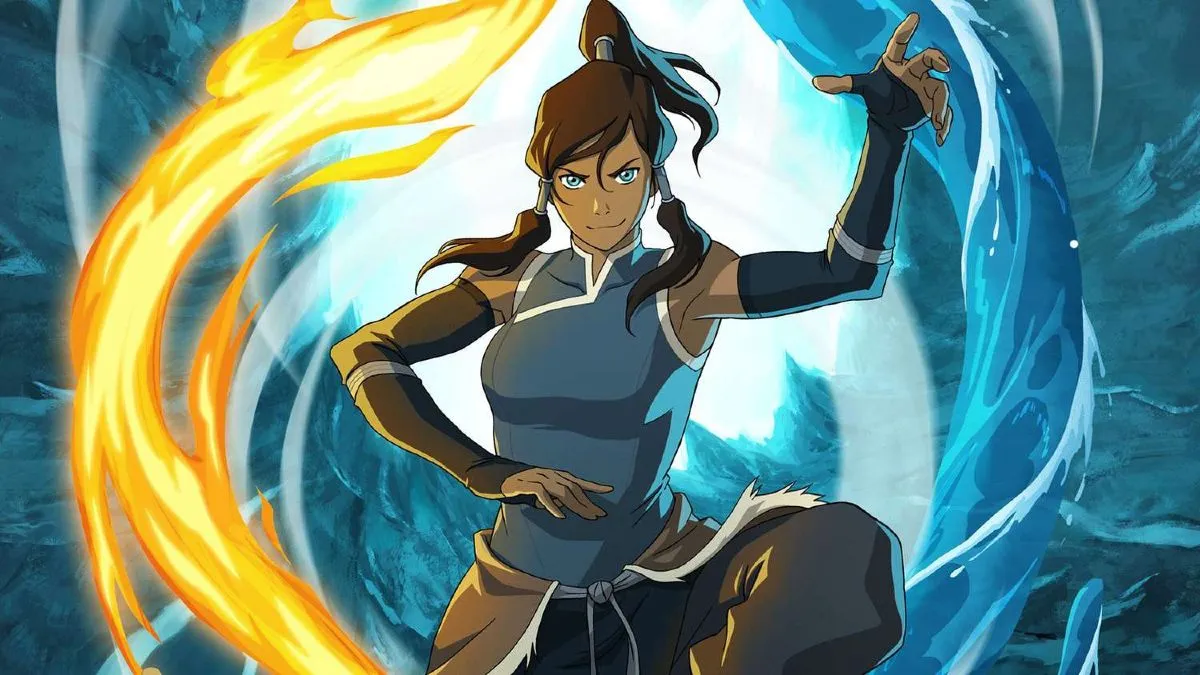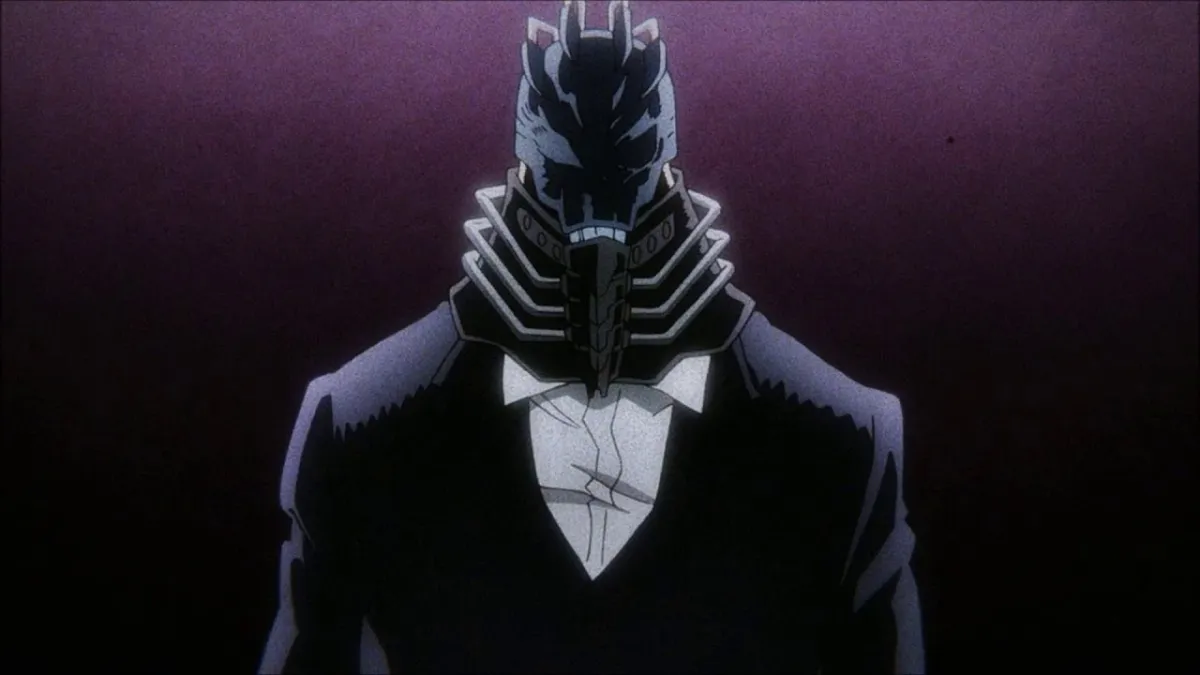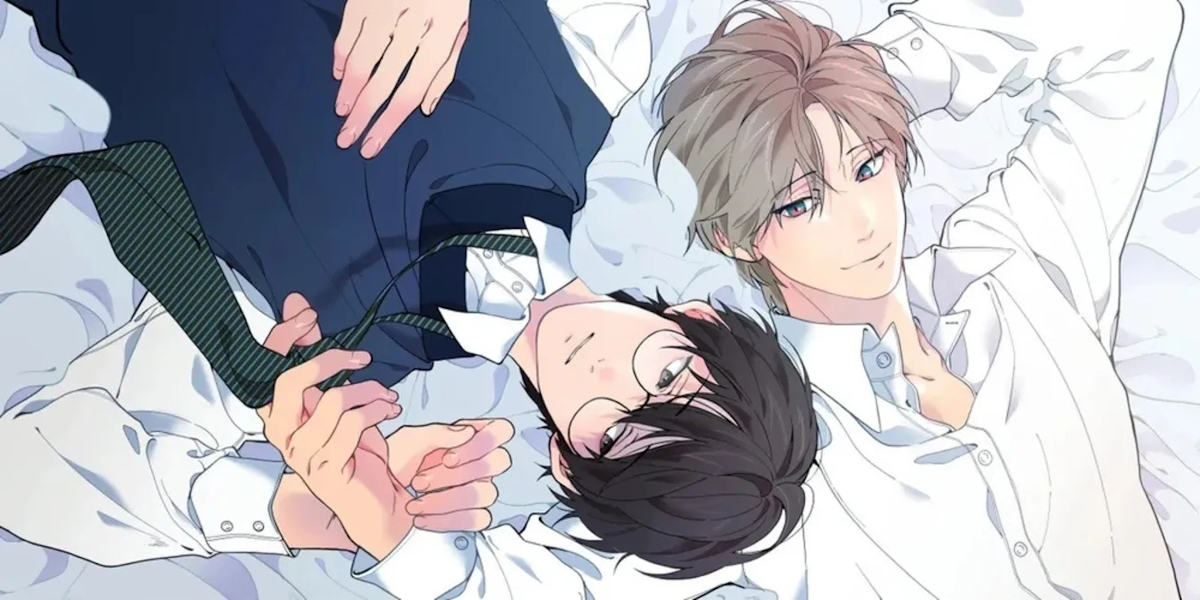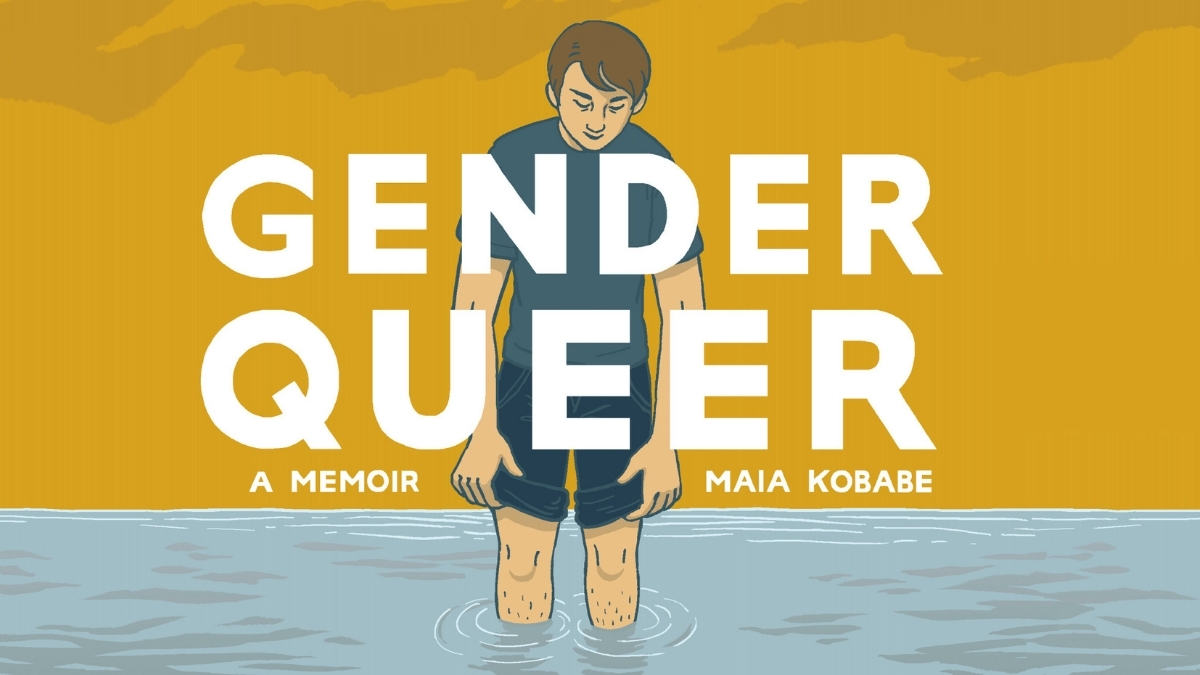As we counseled you in last week’s Pull Wisely, one of the most awesome titles released was DC’s Starfire #1, written by one of our favorite teams, Amanda Conner and Jimmy Palmiotti! It’s a great new approach to a more fully-clothed Starfire that’s extremely new-reader friendly, while also giving fans the Starfire they know and love. This week, Conner and Palmiotti are at it again with an all-new, six-issue mini-series, Harley Quinn and Power Girl. Issue number one in this hilarious new series drops tomorrow. To celebrate their seeming domination of comics lately, Conner and Palmiotti chatted with The Mary Sue about their two new titles and what they love about writing female relationships (no, not that!) and the “soap opera part of comics.”
It was really important to the team Starfire #1 be accessible to new fans. Says Conner, “We were worried! When you’re so close to it, sometimes you can’t tell. We have to get feedback to find out if we’re making it accessible.” Palmiotti stresses the importance of inclusivity for new readers. “We definitely set out with the idea that this might be the first time you’ve ever read this character,” he explains “So, it’s really important for us to at least give you a little back story enough that you don’t feel like you’ve missed too much, and yet that you’re in the place now where you’re following her and you feel like you’re with her for the ride. That you’re not being left out, or there’s not an in-joke that It’s really important to us for every first issue to always make sure this is happening.”
In Starfire #1, Starfire, aka Koriand’r (aka Kori) finds herself in Key West, Florida, and she’s telling her story to Sheriff Gomez, a woman who eventually becomes her friend and protector. One of the great things about the comic are the clothes Kori chooses, both in her natural state, and when she goes shopping for human clothing with Sheriff Gomez. While they’re not as revealing as her previous costumes have been, they’re also not entirely skin-covering either. They’re conscious character choices that Conner, in particular, gave a lot of thought. When asked about Kori’s clothing choices, Conner brightened.
“I just think that she likes pretty things, much in the same way that I do,” Conner says. “When we did the shopping scene, it was sort of like pulling from experience – or me dragging Jimmy and going Jimmy, look at this! I want this! [laughs] Well, the costume itself, I think that’s just comfortable for her. It allows a lot of sun to get into her skin, which she needs. It’s not space pasties, and she should be able to move around in it comfortably without things popping off and spilling out.”
Setting also plays a key factor:
Palmiotti: “The book’s set in Key West, and it’s a vacation type of town. People go down there–would hedonistic be a good word?”
Conner: “Well, Key West is rather hedonistic, yeah. People who just want to let loose go down and visit, and people who want to let loose all the time actually move down there.”
Palmiotti: “So, the costume reflects some of that. And when Amanda–when we got the job, the first thing you wanted to do was go in there and tweak the costume right away. Why?”
Conner: “Because I like to do that!”
Palmiotti: She’s done it with every character! Harley Quinn was a victim of that, Power Girl was a victim of that. Every time Amanda does it, the clothing changes somehow.
Conner: I’m a frustrated designer. [laughs]
In addition to being a practical choice, Kori’s clothes are also reflective of her bright and open personality. When told that Kori doesn’t seem to be a pants person, Conner agrees, “No, she’s not. And again, I’m thinking she’s solar powered. So, she doesn’t want to cover up too much, because she needs to absorb rays. Kori has her own ideas of what she likes, and Sheriff Gomez has her own ideas about what works.”
Both Conner and Palmiotti always put character first, and love talking about how character affects story, not the other way around. “And [the shopping scene] is basically set up for us to see how she interacts with normal people,” Palmiotti explains. “This isn’t superheroes and supervillains. This is actually — a sheriff who has her job and her uniform, and the guy in the dress shop has his idea of what he’d like to see her in, and Kori has This feels good, or This doesn’t feel good. Like, she’s not conscious of what other people are thinking of her, which plays into the scene later on where she’s in the shower and she just walks outside.”
He continued, “It’s sort of like, she’s new to this, and we’re following her with her giant learning curve of what is right, and what is wrong, or the perception of something. The fun of writing her character is that she follows her emotions. She just says what she feels and does what she feels, and she has a lot of empathy. She’s being very conscious at this point in the story of what others think of her, and yet she’s staying true to who she is. And that’s important to us with this character all the time.”
Both Starfire and Harley Quinn and Power Girl focus on female friendships, and the relationship between Sheriff Gomez and Kori is integral to the Starfire title. “Sheriff Gomez, she’s used to being a big sister,” Conner says. “She has a younger brother, and she was raised by her grandmother – we don’t know yet…something happened with her parents – but she’s used to having a protective instinct, and I think Kori brings that out in her. Which is sort of a funny dynamic – the person without the superpowers is feeling protective of the person with the super strength and the star bolts and the flying. We just thought that’d be a fun way to play this off. That’s sort of where we’re going with the relationship, and they’ll be getting closer. As they talk to each other, we’ll find out more about them.”
Palmiotti elaborates on the Kori/Gomez relationship:
In the second issue, we have a scene with them having a little argument, and they’re both right in their argument. They’re both 100% right in their argument. But Kori, not understanding part of the argument, causes her to do something. And it’s also what friendships are about – you both feel right, but you find that middle ground. So, I think the relationship with the both of them is a lot of fun. Then her brother gets involved, and she’s very protective of her brother, and her brother’s dealing with Kori on a different level. So, the relationships are very important, and I think every book we’ve ever worked on, there’s always a strong female-female relationship, whether it’s sisterly, motherly, or best friends.
That kind of focus on relationships is Conner and Palmiotti’s favorite part of writing comics. “We love that part of it,” Palmiotti says. “Look, we love the soap opera part of comics.”
“That’s the fun part!” Conner chimes in.
“Yeah, that’s the fun part,” Palmiotti continues. “Even growing up, I thought, you know, Spider-Man is great, but I love when it’s Peter Parker and Mary Jane and Gwen. I always dug that.”
This week, in Harley Quinn and Power Girl, we’ll get to explore a new, if sort of insane, female relationship.
“The way we write [Harley],” Connor explains. “She’s a psycho-killer with a heart of gold. And even though destruction happens all around her, in her head, she’s a hero. That’s how we approach Harley. So, when she sees Power Girl, she thinks This is my chance to play with the big team! Oh my God, this is Power Girl!”
“And Power Girl doesn’t know who she is, because she has amnesia,” Palmiotti continues. “So, [Harley] sees the opportunity and jumps at it and says Yeah! I’m your sidekick! We fight crime together! [laughs] It’s Harley’s way of saying Yeah, I want to do this. But eventually it falls back on Harley being a bit of an extreme character. In our book, Harley is also a doctor – a psychiatrist – and she’s a roller derby girl. It’s just all parts of Harley. She’s a little bit schizophrenic…”
“Oh, yeah,” Conner agrees.
“So, you never know which Harley you’re gonna get,” Palmiotti continues. “But there’s a point in her brain where she thinks she’s doing the right thing, and helping people, and we always kind of grab onto that. On some level, people sometimes think they’re doing the right thing, but they do the wrong thing, but they’re doing it for the right reasons. That’s the way of the world, sadly – or happily. And Harley and Power Girl – they’re fun to watch, because Power Girl has this definite set of rules. Harley just shoots somebody, and Power Girl yells at her saying No! You can’t do that! And Harley goes Oh, OK! [laughs] And it’s already done. So Power Girl has no choice but to move on at that point. It’s really fun to write those characters together, because it’s almost like Power Girl is like the big sister to her. She has to keep an eye on her all the time, but at the same time, she wants to run away from her all the time.”
“And Power Girl has no idea who she is. It’s like trying to corral – like people say – a herd of cats,” Conner says.
“We kinda write her a little different than the Suicide Squad Harley,” Palmiotti says. “Because we feel like, in our book, she’s the hero of the book.”
She’s totally our hero too! When you head to the comic shop tomorrow, make sure you have a looksee at both Starfire #1 and Harley Quinn and Power Girl #1, as they are both prime examples of what can happen when you let nuanced female characters lead a book.
—Please make note of The Mary Sue’s general comment policy.—
Do you follow The Mary Sue on Twitter, Facebook, Tumblr, Pinterest, & Google +?



